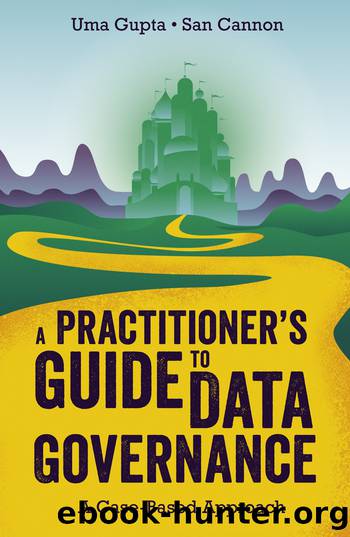A Practitioner's Guide to Data Governance by Gupta Uma;Cannon San;

Author:Gupta, Uma;Cannon, San;
Language: eng
Format: epub
Publisher: Emerald Publishing Limited
Published: 2019-09-25T00:00:00+00:00
The goal is to allow others to understand the data used for the research and allow for potential replication or extension of the work.
Enterprise data, on the other hand, exist in applications or internal repositories and might need to be combined with other enterprise data to study a particular function or business process. These data exist to run a business function, and enterprise data management roles are important for ensuring that enterprise data are suited for answering business questions. There are well-established best practices and maturity levels, such as those described in Chapter 7 to describe how enterprise data are and should be managed.
For institutions that have both enterprise analytics and research functions, the dichotomy can be painful for data management and data governance solutions. Many data management practices that are essential for good enterprise data management have no relevance to research data management. Take data quality, for example. Good data management practices would outline how to define data elements, measure their accuracy, and report on the measurements, outline remediation strategies and decision rights for deviations from an agreed quality standard.xvii For customer data in a marketing database or employee data in a personnel system, all of these activities are appropriate and important. For research data collected from a lab experiment or human subject interviews or possibly purchased from a third-party data vendor, none of these practices are relevant. The definition of the data elements may be dictated by the vendor or defined by the system or lab equipment. Accuracy may not be relevant or easily measured. More likely, it can be measured, but deviations from some standard may not be able to be addressed. There may be no decision rights relevant to changing an observation that comes from a survey respondent or a data broker.
Other aspects of enterprise data governance suffer from the same disconnect when applied to research data. Yet it can be difficult for organizations to understand how to make allowances for such a dichotomy. That is not to say that research data do not require careful management, they most certainly do. But that management looks very different than data management for enterprise data. As analytics advance and more and different data are used in more atypical ways, understanding the difference and working to manage both types appropriately will be even more critical. Yet it seems that the enterprise data and research data worlds are largely unaware of, or possibly just unconcerned with, each other's existence. When designing a data governance framework, it is important to be intentional about how research data need to be addressed. It might be that a separate but similar structure to oversee research data issues can be established with formal ties to the enterprise data governance structure to ensure communication and commonality where relevant.
Download
This site does not store any files on its server. We only index and link to content provided by other sites. Please contact the content providers to delete copyright contents if any and email us, we'll remove relevant links or contents immediately.
Hit Refresh by Satya Nadella(8361)
The Compound Effect by Darren Hardy(7619)
Change Your Questions, Change Your Life by Marilee Adams(6687)
Nudge - Improving Decisions about Health, Wealth, and Happiness by Thaler Sunstein(6667)
The Black Swan by Nassim Nicholas Taleb(6237)
Daring Greatly by Brene Brown(5679)
Deep Work by Cal Newport(5550)
Principles: Life and Work by Ray Dalio(5360)
Rich Dad Poor Dad by Robert T. Kiyosaki(5191)
The Myth of the Strong Leader by Archie Brown(4809)
Man-made Catastrophes and Risk Information Concealment by Dmitry Chernov & Didier Sornette(4786)
Big Magic: Creative Living Beyond Fear by Elizabeth Gilbert(4763)
The Slight Edge by Jeff Olson(4746)
Discipline Equals Freedom by Jocko Willink(4659)
Digital Minimalism by Cal Newport;(4617)
The Motivation Myth by Jeff Haden(4556)
Stone's Rules by Roger Stone(4438)
Management Strategies for the Cloud Revolution: How Cloud Computing Is Transforming Business and Why You Can't Afford to Be Left Behind by Charles Babcock(4150)
The Doodle Revolution by Sunni Brown(4067)
